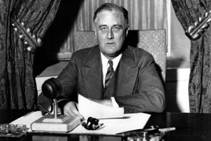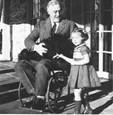Become A Sponsor
|
Why Ads

"The only thing we have to fear is fear itself."
Who is Franklin Delano Roosevelt? FDR was the thirty-second President of the United States . He was the president during the Great Depression, which was a time period where the economy crashed. The Great Depression started with the Stock Market Crash of 1929. During the 1920s, the value of these stocks increased a lot. In 1932 and 1933, the Stock Market decreased rapidly. This decrease affected everyone in the United States . People began to feel as though they were at risk of losing all their savings and, because they were so poor, they did not buy a lot of products. Many people who deposited their money into the banks wanted to withdraw money, but these banks could not give back all of the money that was deposited. One hundred forty billion dollars that was deposited in the banks was lost and disappeared.

In 1933, Franklin Delano Roosevelt was elected into office. America had a “Bank Holiday,” which was when FDR closed the banks for three days. He created the New Deal, which was meant to help the economy to recover. The Congress made up many groups to help to relieve the economy. Some of these groups were NRA, FDIC, and AAA. This was part of the first phase of the New Deal. The second phase of the New Deal was to help the people of America get jobs. The social security system was established in 1935 for people to have economic security.
Roosevelt had to have a lot of courage to run this country during such a harsh time. He also had a lot of courage because he was suffering from poliomyelitis. In summer 1921, he was diagnosed with this disease. He started to get tired, and he couldn't move his legs. With this disability, Roosevelt could not do things by himself. He had to have someone help him do everyday things. He swam to try to get more movement into his legs. He spent a lot of money trying to find a cure for poliomyelitis. Jonas Salk made a vaccine to stop poliomyelitis because of Roosevelt 's efforts to find a cure for it. Even with this disability, Roosevelt ran the country through the most devastating time the United States had ever faced.

"THE NEW DEAL":
A package of programs introduced by President Roosevelt aimed at ending the Depression by stimulating the economy and putting people back to work. The "New Deal" programs were enacted during the first 100 days of the Roosevelt Administration.
March 9: Emergency Banking Act
March 20: Economy Act
March 31: Civilian Conservation Corps established
April 19: End of the gold standard
May 12: Emergency Farm Mortgage Act
May 18: Tennessee Valley Authority established
May 27: Truth in Securities Act
June 13: Home Owners' Loan Act
June 16: National Industrial Recovery Act and
Farm Credit Act |
"I think," his wife, Eleanor ( Roosevelt ), observed, "probably the thing that took most COURAGE in his life was his mastery and his meeting of polio. I never heard him complain." And though anyone remembering how athletic and strong he had been as a young man could not fail to realize what a terrific battle must have gone on within him, "he just accepted it as one of those things that was given you as discipline in life." After his struggle with polio, he seemed less arrogant, less smug, less superficial, more focused, more complex, more interesting. "There had been a plowing up of his nature," Frances Perkins commented. "The man emerged completely warm-hearted, with new humility of spirit and a firmer understanding of philosophical concepts." He had always taken great pleasure in people, but now they become what one historian has called "his vital links to life." Far more intensely than before, he reached out to know them, to understand them, to pick up their emotions, to put himself into their shoes. No longer belonging to his old world in the same way, he came to empathize with the poor and the underprivileged, with people to whom fate had dealt a difficult hand.
What is more, Roosevelt had a remarkable capacity to transmit his internal strength to others, to allow, as White House counsel Sam Rosenman observed, the men and women who came to Washington during the New Deal "to begin to feel it and take part in it, to rejoice in it-- and to return it tenfold by their own confidence." Frances Perkins claimed that "his capacity to inspire and encourage those around him to do tough, confused and practically impossible jobs was without dispute." Like everyone else, she said, she "came away from an interview with the president feeling better not because he had solved any problems," but because he had somehow made her feel more cheerful, more determined, stronger than she had felt when she went into the room. "I have never known a man who gave one a greater sense of security," Eleanor said. "I never heard him say there was a problem that he thought it was impossible for human beings to solve."
Following the attack on Pearl Harbor , FDR had the COURAGE to demand we attack the Japanese mainland. And when he was told it was not possible he stood, to show nothing was impossible. And so his courage lead to the Doolittle Raid and our eventual victory in World War II.
Both my Mom and my Dad were greatly affected by FDR. My Dad and all his brothers were Civilian Conservation Corps (CCC) members and WWII veterans. My Mom's family benefitted from his restoration of the economy keeping the Pennsylvania Railroad busy and my Grandfather employed.
"Courage is not the absence of fear, but rather the assessment that something else is more important than fear." Franklin D. Roosevelt
|





